| Srl | Item |
| 1 |
ID:
096159
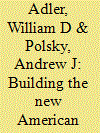

|
|
|
|
|
| Publication |
2010.
|
| Summary/Abstract |
Contend that contrary to traditional notions of a weak national state in our nation's early years, the national state, acting through the Army, was indispensable in shaping the pattern and direction of economic development. They propose a new way of conceptualizing the early American state: a state of the periphery, dominated by the Army, and a state of the center, in which other public institutions also performed key development functions.
|
|
|
|
|
|
|
|
|
|
|
|
|
|
|
|
| 2 |
ID:
096156
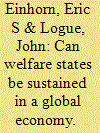

|
|
|
|
|
| Publication |
2010.
|
| Summary/Abstract |
Argue that the European social model can be reformed without sacrificing its gains and that the Scandinavian states have already adapted their welfare state models to meet demographic, social, and economic challenges. They sketch the characteristics of the Scandinavian model, including its underpinnings in encompassing organizations of the less well off, the role of democratic corporatism in policymaking, and the importance of empiricism, social trust, and solidarity in the development of public policy.
|
|
|
|
|
|
|
|
|
|
|
|
|
|
|
|
| 3 |
ID:
096160
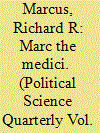

|
|
|
|
|
| Publication |
2010.
|
| Summary/Abstract |
Examines the roots of Madagascar's President Marc Ravalomanana's power and how they grew in leadership and regime expression. He argues that the private sector came to substitute for the bureaucracy, military, and other common bases of neopatrimonial rule thus allowing Ravalomanana to create a personalized economic-political fusion in a democratic context. This ultimately contributed to his downfall.
|
|
|
|
|
|
|
|
|
|
|
|
|
|
|
|
| 4 |
ID:
096157
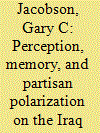

|
|
|
|
|
| Publication |
2010.
|
| Summary/Abstract |
Analyzes four surveys designed to investigate partisan polarization on the Iraq war. He finds that modes of motivated reasoning, including motivated skepticism and selective perception, selective memory, and selective exposure, contributed strongly to the emergence of the unusually wide differences of opinion on the war.
|
|
|
|
|
|
|
|
|
|
|
|
|
|
|
|
| 5 |
ID:
096158
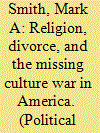

|
|
|
|
|
| Publication |
2010.
|
| Summary/Abstract |
Explains why divorce, an issue that sparked heated controversy earlier in American history, is now absent from the culture war. He shows that religious groups gradually accommodated rising rates of marital breakup by changing their biblical interpretations and deemphasizing divorce as a political issue.
|
|
|
|
|
|
|
|
|
|
|
|
|
|
|
|